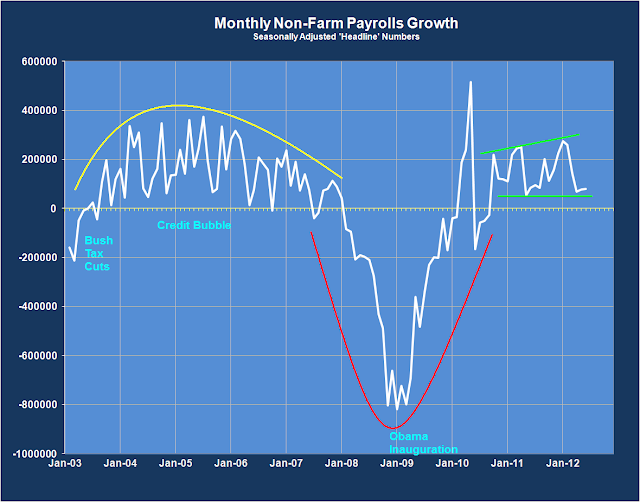Here is a review of the US government's current expenditures.
I suspect that these charts might induce cognitive dissonance in some, and I am sorry for that. But these are things are they are.
The sharp increase in debt under Obama is not because of increased spending, which had already increased significantly with Bush's unfunded wars, but was precipitated primarily by a very sharp decrease in receipts, because of the tax cuts, organized tax avoidance in the predominant financial sector, and most of all the sharp falloff in economic activity from the deepest dive in employment in post war history.
Yes, there are longer term issues with which one must deal. But to provide a medical analogy, when one has been hit by a bus and is in hospital, perhaps that is not the most opportune time to consider going on that long deferred diet and exercise program that you have been considering. The time to undertake that is after you have recovered, or when you are in good health and normal condition. Otherwise you might just end up back in hospital as the cure is worse than the malady, given the circumstances.
Now, I am not saying that stimulus is called for, or that Obama is doing a fine job, or that the economy is back to normal. Anyone who has read this blog regularly should know exactly what I think about the imperative to reform the financial system and the political campaign funding process, which I consider the sine qua non to any sustainable recovery.
But I think it is important to note that what preceded Obama was also not working, not working at all. Those policies led to a massive credit bubble, and a yawning problem in the economy that exploded roughly at the end of Bush' second term. That is not to say that the phony surplus under Clinton was any better, and his own policies as articulated by Robert Rubin and Alan Greenspan that led to the first of the bubbles in tech.
A return to those policies of unfunded wars, tax cuts for the wealthy, privatization and deregulation for ideology's sake, the trickle down economic theory of packing the 'job creators' with excess wealth, and allowing fraud and the shadow banking system to run wild under the guise of efficient markets freedom, will lead to a similar result, of bubble and bust, and a growing inequality of power and wealth that will destabilise the political fabric of society.
The truth is often less comfortable than the oft-repeated lie, which is simpler and easier to understand, and more comforting in its reliance on reflexive primitive emotions. But the lie is always a trap and a snare, and a major impediment to improvement and well being.
The Banks must be restrained, and the financial system reformed, with balance restored to the economy, before there can be any sustained growth and recovery.
And for the love of God, corporations are NOT people, and do not deserve primacy of the peoples' Bill of Rights. When a corporation can shoulder a rifle, or even offer a son or daughter to fight and perhaps die on a battlefield, and spill out its last measure of devotion for its country, then perhaps one might make such a thing equal in rights and protections to a living human being.
But since it is not a life, but an artificial construct, to give corporations equality, much less supremacy of place due to their collective power and wealth, over a living breathing person, is the act of a Frankenstein, and not of a thoughtful and sustainable democracy, but corporatism in its rawest form.
Federal current expenditures are general government final consumption expenditure and includes all government current expenditures for purchases of goods and services (including compensation of employees). It also includes most expenditures on national defense and security, but excludes government military expenditures that are part of government capital formation. Data are in current U.S. dollars.It should be noted that in the latest quarterly update, which is not yet included in this table, the level of government expenditures has stabilized and is no longer in a sharp decline in relative growth.
"US Federal Government Current Expenditures is at a current level of 3.71T, up from 3.708T last quarter. This represents a quarterly annualized growth rate of 0.24%, compared to a long term average annualized growth rate of 7.27%."





















































